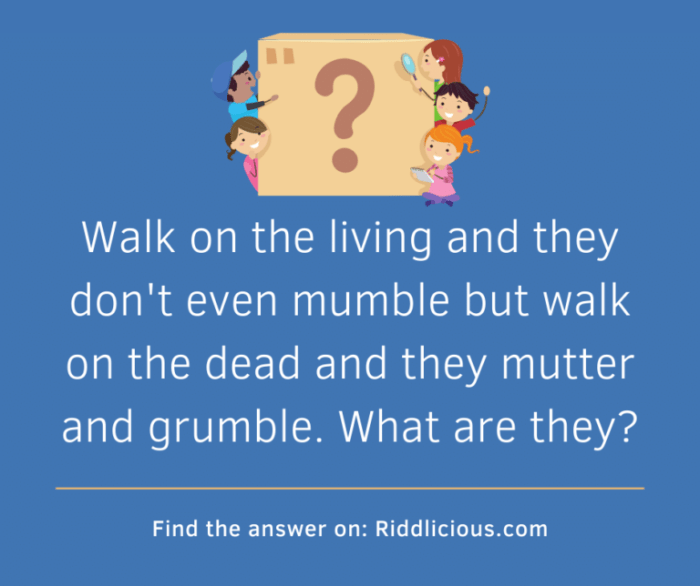Walk on the living they don t even mumble – In the realm of social interactions, the phrase “walk on the living they don’t even mumble” captures a poignant reality. It encapsulates the insidious act of exploiting or disregarding others without uttering a word of remorse.
This phrase serves as a powerful metaphor, inviting us to delve into the intricate dynamics of oppression, silence, and their profound impact on individuals and society as a whole.
1. Interpret the Phrase’s Meaning: Walk On The Living They Don T Even Mumble

The phrase “walk on the living” carries both literal and metaphorical meanings. Literally, it refers to physically treading upon or stepping on living beings. Metaphorically, it signifies the act of treating others with disrespect, indifference, or disregard, as if they were mere objects or obstacles.
Examples of situations where people might “walk on the living” include:
- Bullying or harassing others
- Ignoring the needs or concerns of others
- Exploiting or taking advantage of others
- Disregarding the rights or dignity of others
Being “walked on” can have a profound emotional impact on the victim, leading to feelings of humiliation, anger, resentment, and powerlessness.
2. Explore the Causes and Consequences
Causes of “Walking on the Living”
The reasons why people “walk on the living” are complex and varied. Some common causes include:
- Lack of empathy or compassion
- Selfishness or entitlement
- Power imbalances or social hierarchy
- Unresolved personal issues or trauma
Consequences of “Walking on the Living”
The consequences of “walking on the living” can be far-reaching and detrimental, affecting both the victim and the perpetrator.
Consequences for the Victim
- Emotional distress and trauma
- Damage to self-esteem and confidence
- Impaired relationships and social isolation
- Physical health problems
Consequences for the Perpetrator
- Loss of respect and credibility
- Damage to relationships and reputation
- Legal consequences (in extreme cases)
- Moral guilt and shame
Societal Implications
“Walking on the living” can also have broader societal implications. It can:
- Undermine trust and social cohesion
- Create a culture of fear and intimidation
- Perpetuate inequality and oppression
3. Examine the Role of Silence

The phrase “they don’t even mumble” highlights the significance of silence in the face of injustice. Silence can be a powerful tool, used both to protect oneself and to perpetuate harm.
Reasons for Silence
People may remain silent for a variety of reasons, including:
- Fear of retaliation
- Lack of support or belief
- Guilt or shame
- Internalization of societal norms
Impact of Silence
Silence can have a profound impact on the victim, the perpetrator, and society as a whole.
Impact on the Victim
- Isolation and powerlessness
- Reinforcement of the perpetrator’s behavior
- Perpetuation of the cycle of abuse
Impact on the Perpetrator
- Lack of accountability
- Reinforcement of their behavior
- Increased likelihood of continuing the behavior
Impact on Society
- Normalization of injustice
- Erosion of trust and social cohesion
- Perpetuation of societal inequalities
4. Suggest Strategies for Prevention and Intervention

Prevention Strategies
Preventing people from “walking on the living” requires a multifaceted approach that addresses both individual and societal factors. Some strategies include:
- Promoting empathy and compassion through education and awareness campaigns
- Challenging and changing societal norms that tolerate or condone “walking on the living”
- Providing support and resources for individuals who are at risk of being “walked on”
- Enacting and enforcing laws that protect against bullying and harassment
Intervention Strategies, Walk on the living they don t even mumble
When someone is being “walked on,” it is important to intervene in a safe and effective manner. Strategies include:
- Speaking up and confronting the perpetrator
- Providing support and resources to the victim
- Reporting the incident to authorities or relevant organizations
- Educating the perpetrator about the harmful effects of their behavior
Resources for Victims
If you or someone you know is being “walked on,” there are resources available to help. These include:
- National Domestic Violence Hotline: 1-800-799-SAFE (7233)
- National Sexual Assault Hotline: 1-800-656-HOPE (4673)
- National Suicide Prevention Lifeline: 1-800-273-TALK (8255)
- The Trevor Project (for LGBTQ+ youth): 1-866-488-7386
Popular Questions
What are the common reasons why people “walk on the living”?
Power imbalances, self-interest, lack of empathy, and social norms that condone exploitation are among the key factors that contribute to this behavior.
What are the consequences of “walking on the living” for the victim?
Victims may experience psychological distress, loss of self-esteem, and impaired relationships. They may also face social isolation and discrimination.
Why do people often remain silent in the face of injustice?
Fear of retaliation, social pressure, and a sense of helplessness are common reasons why individuals choose to remain silent when they witness or experience injustice.